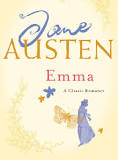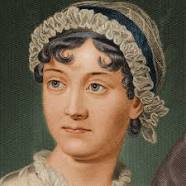Emma Page #4
Emma, by Jane Austen, is a novel about youthful hubris and the perils of misconstrued romance. The story takes place in the fictional village of Highbury and the surrounding estates of Hartfield, Randalls, and Donwell Abbey and involves the relationships among individuals in those locations consisting of "3 or 4 families in a country village". The novel was first published in December 1815 while the author was alive, with its title page listing a publication date of 1816. As in her other novels, Austen explores the concerns and difficulties of genteel women living in Georgian–Regency England; she also creates a lively comedy of manners among her characters and depicts issues of marriage, gender, age, and social status.
Genre: Fiction
Genre: Fiction
- Year:
- 1815
- 1,453 Views
“Dear Emma bears every thing so well,” said her father. “But, Mr. Knightley, she is really very sorry to lose poor Miss Taylor, and I am sure she will miss her more than she thinks for.” Emma turned away her head, divided between tears and smiles. “It is impossible that Emma should not miss such a companion,” said Mr. Knightley. “We should not like her so well as we do, sir, if we could suppose it; but she knows how much the marriage is to Miss Taylor's advantage; she knows how very acceptable it must be, at Miss Taylor's time of life, to be settled in a home of her own, and how important to her to be secure of a comfortable provision, and therefore cannot allow herself to feel so much pain as pleasure. Every friend of Miss Taylor must be glad to have her so happily married.” “And you have forgotten one matter of joy to me,” said Emma, “and a very considerable one--that I made the match myself. I made the match, you know, four years ago; and to have it take place, and be proved in the right, when so many people said Mr. Weston would never marry again, may comfort me for any thing.” Mr. Knightley shook his head at her. Her father fondly replied, “Ah! my dear, I wish you would not make matches and foretell things, for whatever you say always comes to pass. Pray do not make any more matches.” “I promise you to make none for myself, papa; but I must, indeed, for other people. It is the greatest amusement in the world! And after such success, you know!--Every body said that Mr. Weston would never marry again. Oh dear, no! Mr. Weston, who had been a widower so long, and who seemed so perfectly comfortable without a wife, so constantly occupied either in his business in town or among his friends here, always acceptable wherever he went, always cheerful--Mr. Weston need not spend a single evening in the year alone if he did not like it. Oh no! Mr. Weston certainly would never marry again. Some people even talked of a promise to his wife on her deathbed, and others of the son and the uncle not letting him. All manner of solemn nonsense was talked on the subject, but I believed none of it. “Ever since the day--about four years ago--that Miss Taylor and I met with him in Broadway Lane, when, because it began to drizzle, he darted away with so much gallantry, and borrowed two umbrellas for us from Farmer Mitchell's, I made up my mind on the subject. I planned the match from that hour; and when such success has blessed me in this instance, dear papa, you cannot think that I shall leave off match-making.” “I do not understand what you mean by 'success,'” said Mr. Knightley. “Success supposes endeavour. Your time has been properly and delicately spent, if you have been endeavouring for the last four years to bring about this marriage. A worthy employment for a young lady's mind! But if, which I rather imagine, your making the match, as you call it, means only your planning it, your saying to yourself one idle day, 'I think it would be a very good thing for Miss Taylor if Mr. Weston were to marry her,' and saying it again to yourself every now and then afterwards, why do you talk of success? Where is your merit? What are you proud of? You made a lucky guess; and that is all that can be said.”
Translation
Translate and read this book in other languages:
Select another language:
- - Select -
- 简体中文 (Chinese - Simplified)
- 繁體中文 (Chinese - Traditional)
- Español (Spanish)
- Esperanto (Esperanto)
- 日本語 (Japanese)
- Português (Portuguese)
- Deutsch (German)
- العربية (Arabic)
- Français (French)
- Русский (Russian)
- ಕನ್ನಡ (Kannada)
- 한국어 (Korean)
- עברית (Hebrew)
- Gaeilge (Irish)
- Українська (Ukrainian)
- اردو (Urdu)
- Magyar (Hungarian)
- मानक हिन्दी (Hindi)
- Indonesia (Indonesian)
- Italiano (Italian)
- தமிழ் (Tamil)
- Türkçe (Turkish)
- తెలుగు (Telugu)
- ภาษาไทย (Thai)
- Tiếng Việt (Vietnamese)
- Čeština (Czech)
- Polski (Polish)
- Bahasa Indonesia (Indonesian)
- Românește (Romanian)
- Nederlands (Dutch)
- Ελληνικά (Greek)
- Latinum (Latin)
- Svenska (Swedish)
- Dansk (Danish)
- Suomi (Finnish)
- فارسی (Persian)
- ייִדיש (Yiddish)
- հայերեն (Armenian)
- Norsk (Norwegian)
- English (English)
Citation
Use the citation below to add this book to your bibliography:
Style:MLAChicagoAPA
"Emma Books." Literature.com. STANDS4 LLC, 2024. Web. 3 May 2024. <https://www.literature.com/book/emma_29>.




Discuss this Emma book with the community:
Report Comment
We're doing our best to make sure our content is useful, accurate and safe.
If by any chance you spot an inappropriate comment while navigating through our website please use this form to let us know, and we'll take care of it shortly.
Attachment
You need to be logged in to favorite.
Log In